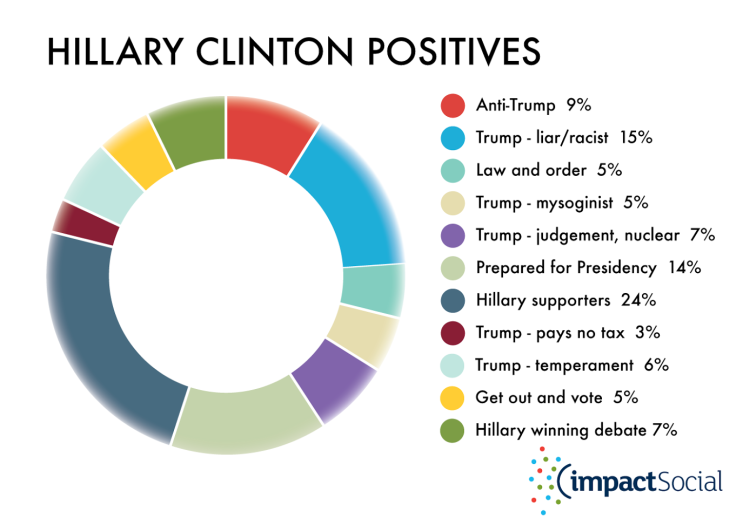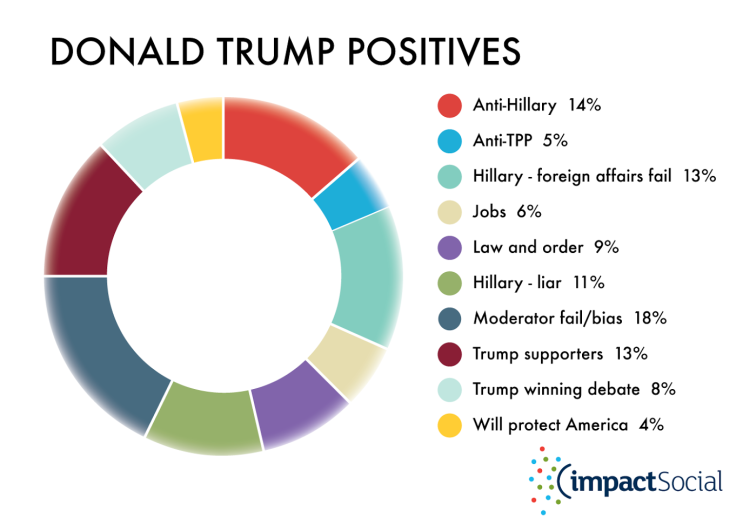Is this the moment the penny dropped for Trump supporters?
Post-debate analysis of voters' responses in the key swing state of Florida shows growing support for Hillary.
Turning points are few and far between in politics. The media is always quick to search for a drama and the historic moment when the tide turned. It rarely happens like that – politics changes with the dawning of slow realisation, rather than than a loud clang of a penny dropping. This week, in the presidential debate, it may have been different. We may have seen something significant happen.
That difference is not so apparent in the media reaction to the debate. The media consensus has it that Hillary Clinton won the first presidential TV debate, albeit on points. There were no knock-out blows landed, no single line that floored Donald Trump, but Clinton was calmer, better prepared, got under his skin a little and even seemed to enjoy it. She scored in the way that TV especially likes it – a few zingers, looking the part, no howlers. By media judgements, it was a small victory in a low-scoring match.
Look at the social media verdicts and the opinions of the voters, however, and her triumph was much bigger than that, and that victory may resonate.
First, though, the context. Things changed in this week's debate because, suddenly, the two candidates were playing the same sport. As soon as someone got a rulebook out, Trump floundered.
TV was supposed to be Trump's home. The experienced reality TV star could nail television way better than Clinton, or so we thought. Put them both in a scripted reality TV show, The Only Way Is Washington, and that's probably the case. But put them both in a debate where the parameters are decided by their inquisitor and a format which dates back to the Kennedy/Nixon debate of 1960 and suddenly Trump found himself strait-jacketed.
His success and his momentum in the weeks leading up to the debate had been founded on his extraordinary chutzpah. He's been post-factual, incoherent on policy and he takes a series of nonsensical undeliverable positions (building a wall, seizing Iran's oil revenues) with all the bravura of an absurdist artist. Little of what he says makes sense, but look at the colours, look at the overall picture.
For Clinton, the rules have been more straightforward. Her lead, though dwindling, was built on her greater experience, political know-how and the Beltway's version of common sense, trying to deal in fact and the world as it is, rather than as it might be.
So the debate was a genuine test of traditional politics versus post-factual populism, but the setting was old-school.
So never mind the media verdict, who won amongst the voters?
The social media analysis company Impact Social looked at voter reaction on social media posts and comments on open news forums. And they did it where it mattered – removing media and the posts from significant political influencers and looking at the verdicts of voters in the key swing state of Florida, which has 29 electoral college votes and is neck and neck in the polls. Verdicts reached here are significant and the traffic was big. Impact Social looked at 50,000 posts in the 10 hours following the start of the debate – covering the reaction during the debate and not just to the TV soundbites. The lens, therefore, is a simple one: who won, based on reactions to what was actually said? Who had the messages that landed?

The first significant finding was who had the "share of voice"? Who said the things that prompted conversations? Clinton, by a country mile. She generated 65% of the verdicts (removing the neutral reporting), compared to Trump's 35%, getting on for double the impact he was making.
Even more significantly, the reaction to her leadership of the topics was positive. Breaking down the conversations held online showed that it was her attacks on Trump – on nuclear weapons, on jobs, on tax – that were fuelling the conversation, and were driving a significant amount of anti-Trump rhetoric, accusing him of being a liar and a racist (15%), a misogynist (5%), temperamentally unsuited (5%) and more. After all the fuss about her illness, she suddenly seemed in control, "prepared for the presidency" (14% of the backing).

For Trump, the fact he was playing by someone else's rules was clearly a significant problem. Aside from the general pro-Trump noise (largely matched on the other side by general pro-Clinton noise), the only significant point they raised together was their perception of moderator bias (18% of the comments). And if you're attacking the referee, then you're losing the game.
Give Trump a baying crowd and the stage to himself and he's at home, but give him a challenger on the same stage and a set of questions he's not pre-approved and things got difficult for him. He was suddenly playing politics by the same rules as everyone else and it became tricky, but that's the game he's in from now on, not least with two more debates to come. And perhaps it showed how he'd perform on the world stage with other leaders who feel empowered to challenge him. Suddenly, the momentum seemed to fall away from Trump. Perhaps we've seen a turning point after all.
Jimmy Leach is a digital consultant, working on platforms and communications for governments, corporations and start-ups.
© Copyright IBTimes 2025. All rights reserved.






















